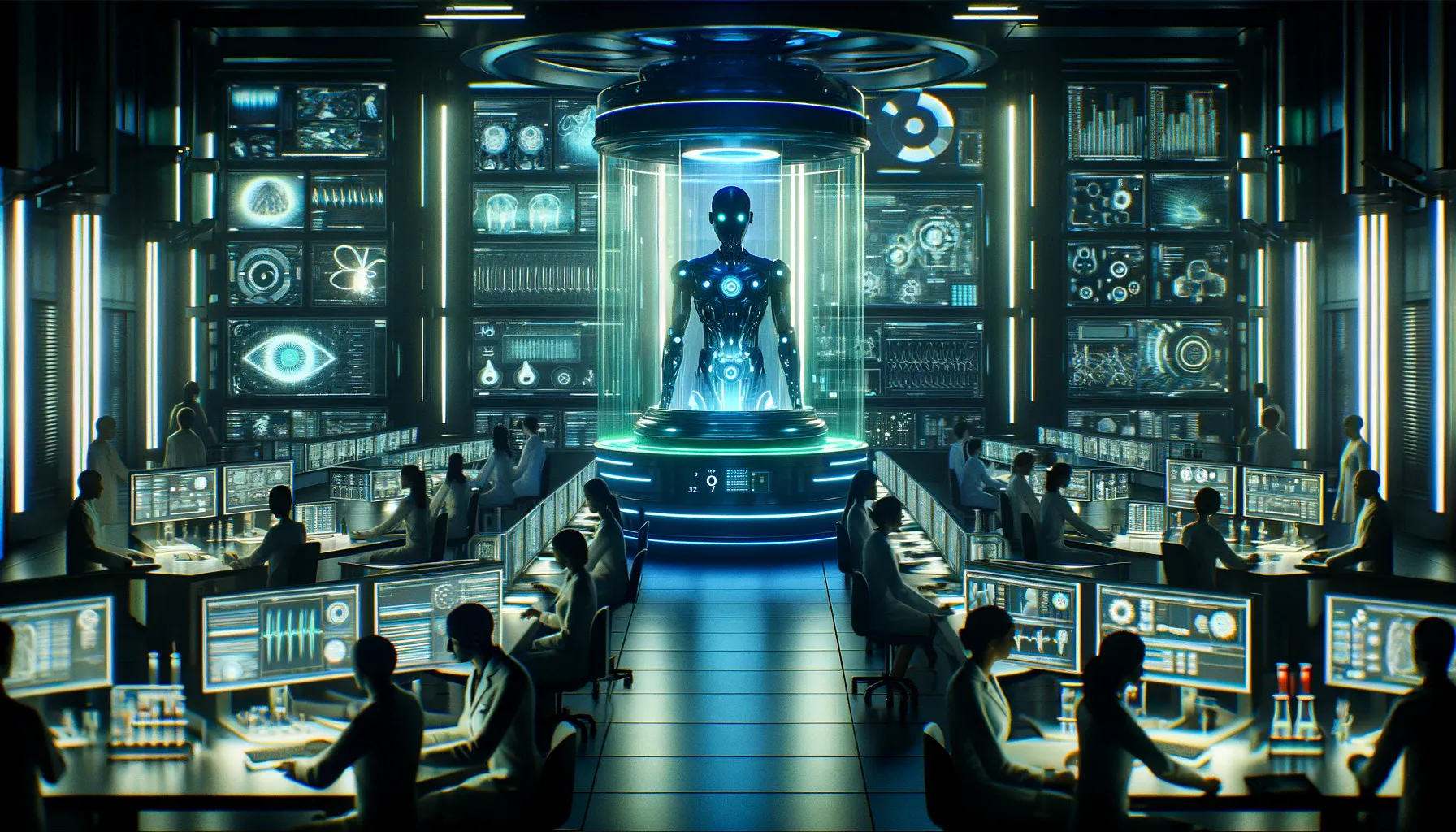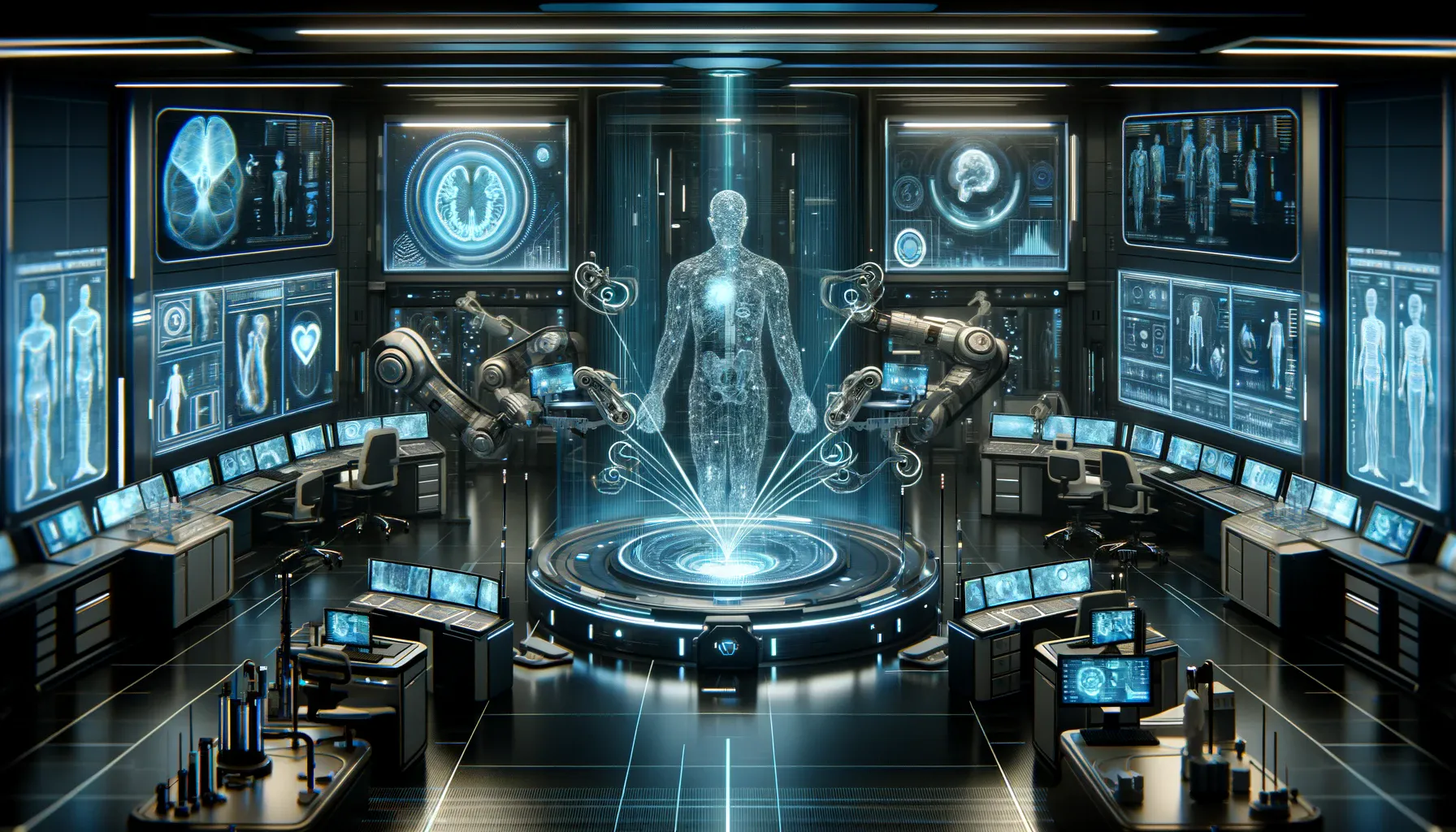Table of Contents
Artificial intelligence (AI) has been making remarkable strides in various industries in recent years, and the medical field is no exception. The convergence of advanced technology, data analytics, and healthcare has given rise to a once-in-a-generation transformation known as the Medical Leap Forward with AI.
This revolutionary leap has the potential to redefine the way we diagnose, treat, and manage medical conditions, bringing unprecedented safety and efficiency to medical labs.
The Current Landscape of AI in Healthcare
The healthcare industry has always been at the forefront of innovation, with a relentless pursuit of improving patient outcomes and treatment efficiency. AI has emerged as a powerful tool in this endeavor. With the integration of machine learning algorithms and deep neural networks, medical labs are witnessing a transformation like never before.
Zebra Medical Vision specializes in medical imaging analysis. Their AI algorithms can detect various diseases, such as breast cancer, liver disease, and osteoporosis, from medical images like X-rays, CT scans, and mammograms. This can assist radiologists in early disease detection.
The Medical Leap Forward with AI
The Medical Leap Forward with AI signifies a transformative advance in the field of healthcare, marked by the integration of artificial intelligence to elevate the capabilities of healthcare professionals and institutions. This turnaround encompasses a diverse array of applications designed to revolutionize healthcare delivery. Some key areas include:
Medical Imaging: One of the most prominent areas where AI is making a significant impact is medical imaging. Radiologists and clinicians are using AI algorithms to assist in the early detection of diseases such as cancer, heart conditions, and neurological disorders. Google’s DeepMind has developed an AI model to analyze retinal scans to detect diabetic retinopathy, potentially preventing blindness.

This remarkable advancement in AI-powered medical imaging not only enhances diagnostic accuracy but also enables earlier interventions, ultimately improving patient outcomes and reducing healthcare costs. The synergy between medical expertise and AI technology is heralding a medical leap forward, transforming the way we approach disease detection and treatment.
Drug Discovery: AI is revolutionizing the pharmaceutical industry by accelerating the drug discovery process through the analysis of extensive datasets. Leading pharmaceutical companies such as Pfizer are leveraging AI to predict the interactions between various molecules and human cells. This transformative approach has not only significantly reduced the time required for developing new medications but has also substantially cut down on development costs. In essence, a medical leap forward with AI, driving innovation and efficiency in drug discovery, ultimately benefiting patients worldwide.
Telemedicine: The COVID-19 pandemic brought about a Medical Leap Forward with AI, expediting the widespread acceptance of telemedicine. Artificial Intelligence (AI) emerged as a pivotal component in enhancing the efficiency of virtual healthcare consultations. AI-driven chatbots and virtual assistants have significantly contributed to this advancement by assisting patients in various ways, including symptom checking, medication reminders, and appointment scheduling. These AI-powered tools have revolutionized healthcare by improving access to medical services and ensuring that patients receive timely and personalized care.
Personalized Medicine: AI is revolutionizing healthcare by enabling personalized treatment plans through the analysis of an individual’s genetic makeup, medical history, and lifestyle data. This approach ensures that patients receive tailored therapies, maximizing the effectiveness of treatments while minimizing side effects. AI’s ability to process vast amounts of data and identify precise treatment options has ushered in a medical leap forward with AI, providing patients with more targeted and efficient healthcare solutions.
Deep Genomics is at the forefront of AI-driven drug discovery. Their platform combines genetic data with machine learning to identify potential drug candidates and predict their effects on specific genetic mutations. This approach has the potential to revolutionize the development of treatments for rare genetic disorders.

Generative AI in Healthcare
Generative AI, a subset of artificial intelligence, has gained prominence in recent years. It involves the use of algorithms to generate content or data, often in the form of text, images, or even synthetic data. In the healthcare industry, generative AI is making waves in several ways, marking a significant Medical Leap Forward with AI. These advancements include the ability to generate medical reports and summaries, which can save healthcare professionals valuable time and reduce the risk of errors.
Generative AI can also assist in drug discovery by simulating and generating potential drug compounds, accelerating the research and development process. Moreover, it enables the creation of realistic medical images for training purposes and enhances diagnostic accuracy. In sum, generative AI is revolutionizing healthcare by offering innovative solutions that improve patient care and drive medical research to new heights.
Generating Synthetic Patient Data: Generative AI has ushered in a Medical Leap Forward AI by enabling the creation of synthetic patient data that is virtually indistinguishable from real patient information. This breakthrough technology has become invaluable for healthcare researchers and data scientists as it allows them to develop and test healthcare algorithms without compromising patient privacy.
With stringent privacy regulations in place, synthetic patient data serves as a crucial tool, enabling the safe and ethical advancement of AI-driven healthcare solutions. Researchers can harness the power of synthetic data to train AI models effectively, fostering innovation while upholding the highest standards of patient confidentiality and data protection in the medical field.
Drug Discovery: Generative AI has emerged as a groundbreaking technology that promises to revolutionize drug discovery, representing a significant Medical Leap Forward with AI. By harnessing the power of artificial intelligence, researchers can expedite the identification of potential drug candidates while simultaneously reducing the associated costs. One of the most remarkable applications of generative AI in this field involves its ability to generate molecular structures for potential drug compounds. This process streamlines the early stages of drug development by swiftly proposing novel chemical structures that could exhibit therapeutic properties.
Traditional drug discovery methods often involve laborious and time-consuming experimental work, but generative AI has the potential to accelerate the process, making it more efficient and cost-effective. As a result, generative AI is poised to play a pivotal role in advancing medical science by ushering in a new era of drug discovery that holds the promise of transforming healthcare.

The Future of AI in the Medical Field
The Medical Leap Forward with AI is just the beginning of a transformative journey in healthcare. The future holds exciting possibilities and challenges:
Enhanced Diagnostics: As part of the Medical Leap Forward with AI, enhanced diagnostics is a pivotal aspect of healthcare transformation. AI technology is poised to revolutionize the accuracy of medical diagnoses by analyzing various data sources, including medical images, patient data, and genomic information. This advancement holds the promise of early disease detection and more precise risk assessment.
By harnessing the power of AI, healthcare providers can identify medical conditions at their earliest stages, enabling timely interventions and significantly improving patient outcomes. The Medical Leap Forward with AI marks a critical turning point in healthcare where AI-driven diagnostics will be instrumental in reshaping the landscape of medical diagnosis and patient care.
Treatment Optimization: Treatment optimization is a groundbreaking aspect of healthcare’s future. AI-powered algorithms are set to revolutionize the way treatment plans are created and implemented. These algorithms will take into account a wide range of individual patient factors, including medical history, genetic predispositions, lifestyle, and even real-time health data.
This level of personalized analysis and decision-making will lead to treatment plans that are not only more effective but also tailored specifically to each patient’s unique needs. It marks a significant departure from the traditional one-size-fits-all approach to medicine. Patients will receive care that is finely tuned to their circumstances, resulting in improved outcomes and a higher quality of care.
Remote Monitoring: This technology harnesses AI to continuously track the health of patients in real-time, offering a game-changing capability for healthcare providers. By constantly monitoring vital signs, symptoms, and other health parameters from a distance, healthcare professionals can detect potential issues early on. This early intervention not only improves patient outcomes but also helps in reducing hospitalization rates. In essence, remote monitoring powered by AI represents a crucial aspect of the Medical Leap Forward with AI, reshaping how healthcare is delivered and ensuring that patients receive timely and proactive care.

Ethical and Regulatory Considerations: The ongoing Medical Leap Forward with AI necessitates significant attention to ethical and regulatory aspects. As AI continues to be integrated into healthcare, existing frameworks must evolve to address key concerns. This includes safeguarding patient privacy, ensuring robust data security measures, and establishing fairness in AI-driven decision-making processes. These considerations are essential to harness the full potential of AI while upholding the highest standards of healthcare ethics and patient protection.
Conclusion
The “Medical Leap Forward with AI” signifies a transformative moment in healthcare. AI integration in medical imaging, diagnostics, drug discovery, and more is opening up remarkable possibilities. The future of AI in the medical field looks promising, promising improved patient care, cost reduction, and innovative advancements. This represents a watershed moment in healthcare innovation.
Generative AI, part of the Medical Leap Forward with AI, is set to revolutionize healthcare. It will accelerate drug discovery, improve medical imaging, and enable the generation of synthetic patient data for research. With ongoing breakthroughs and real-world applications, the future of AI in healthcare is rapidly answering questions and transforming the industry.
As we continue to embrace and adapt to these technological advancements, the once-in-a-generation Medical Leap Forward with AI offers hope for a healthier and more prosperous future in healthcare.